Resumes and LinkedIn profiles are great, but they often aren’t enough to catch the eye of potential clients and employers.
Based on our experience, to make an impact, you need an online portfolio that showcases your best work professionally and engagingly.
Don’t worry if you’re not tech-savvy, because we’re here to help.
In this article, we’ll show you step-by-step how to create an online portfolio website in WordPress.
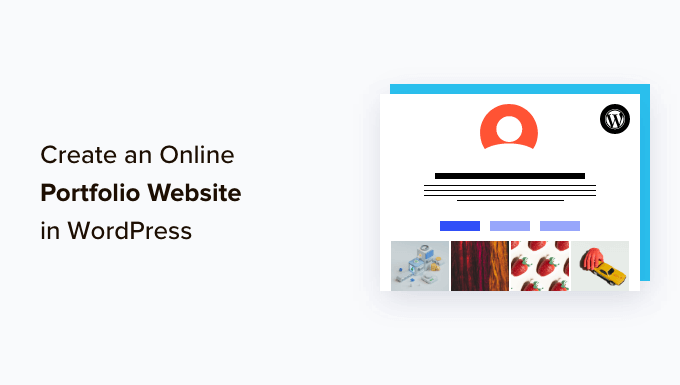
Why Do You Need an Online Portfolio Website?
Portfolios are assets for everyone, including freelancers, job seekers, and small businesses.
Now, you can think of an online portfolio as your digital business card.
For example, wherever you meet your prospects, you can easily direct them to your portfolio website. So, instead of fumbling for past work samples, you can confidently send your potential customers or future employers to your stunning online portfolio.
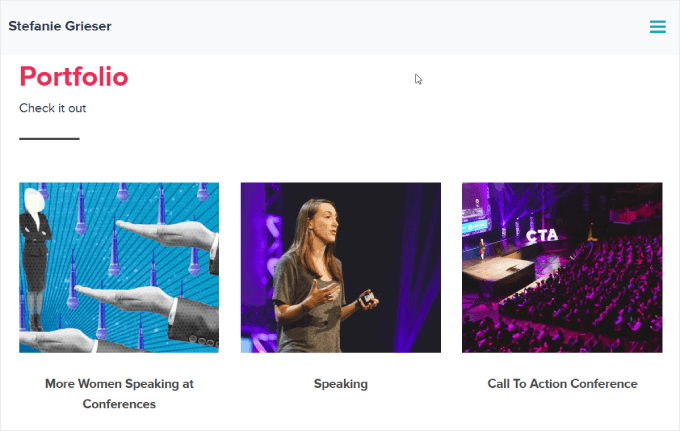
While you may think a portfolio is only for artists or creatives, that’s simply not true.
It works for any profession, whether you’re a graphic designer, writer, or developer, and it offers a chance to put your best foot forward in your industry.
In a nutshell, your portfolio website can help you stand out from the crowd and build trust. When you design a professional portfolio site, you instantly gain credibility and showcase your experience.
You can also optimize your site for search engines based on specific keywords so that more people can find you.
💡 Short on time but need a stunning online portfolio website for your business? WPBeginner Pro Services can help! We’ll handle everything from design to SEO, delivering a custom portfolio website tailored to your needs. Get Our WordPress Website Design Services Today!
With that in mind, we’ll share how to create an online portfolio website in WordPress.
Ready? Let’s get started.
How to Create an Online Portfolio Website in WordPress with SeedProd
You don’t need to learn how to code or write HTML to build your portfolio site. Simply follow our step-by-step instructions, and your website will be up and running in minutes.
1. Choose a WordPress Host
To get started, you’ll need a domain name and web host. The web host stores your website files and is your site’s home on the internet.
A good web host should be scalable enough to handle demanding sites, offer support if anything goes wrong, take web security seriously, and have features to keep you safe.
You should also be looking for the fastest WordPress hosting providers, which helps your site load quickly.
Hostinger is the best choice for small businesses that want affordable, beginner-friendly hosting.
Fortunately, Hostinger has agreed to offer our readers a free domain name and a huge discount on WordPress hosting. You can get started for just $2.24 per month.
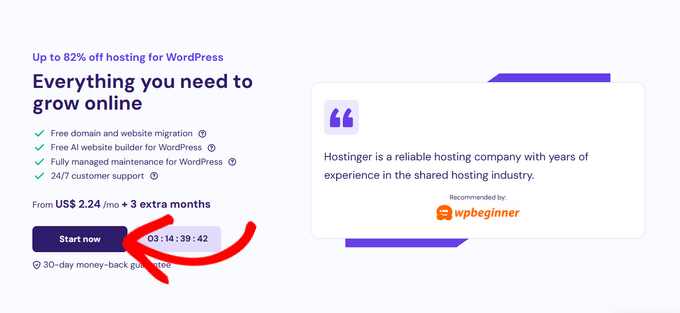
To get set up with Hostinger in a few minutes, simply click this button:
If you need help signing up for Hostinger, check out our post on how to get a free domain name, where you find a step-by-step tutorial.
Once you’ve registered and set up your hosting plan, you can just go into your dashboard and select the ‘Domains’ tab.
From there, you’ll need to enter a new domain name.
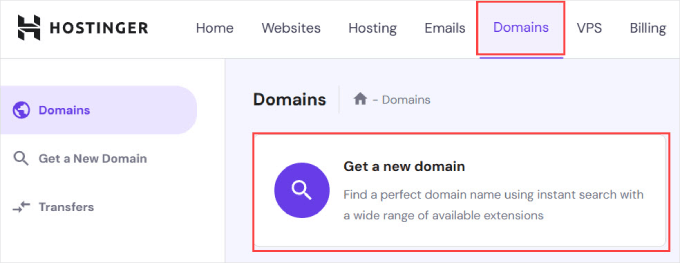
You’ll then be prompted to create a new or migrate an existing site.
For this tutorial, you can click the ‘Skip, create an empty website.’
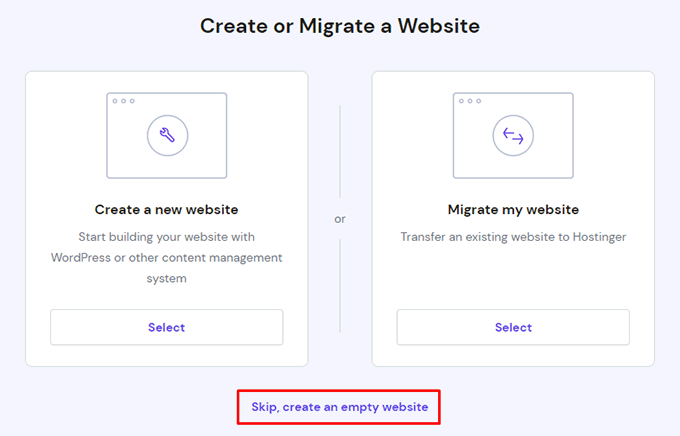
Next, let’s click the ‘Select’ button under ‘Claim a Free Domain.’
You can simply enter the domain name you want for your portfolio website.
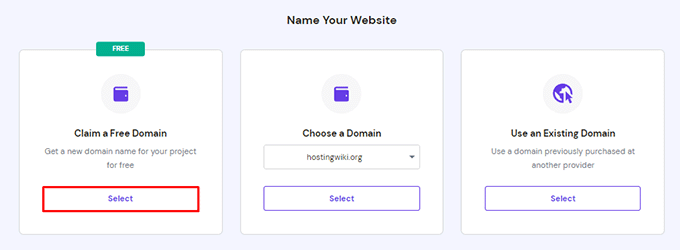
If you need help deciding on a domain name, WPBeginner offers a free business name generator to help you find a company name that is easy to read and promote online.
Of course, if you’re creating a personal portfolio, the easiest thing to do would be to use your first and last name as a domain name. If it’s taken, you can add your profession, along with your first name.
For example, if johndoe.com is taken, you might find johndoephotography.com or janedoewriter.com.
Ideally, you should stick to the .com domain extension since it’s the most recognizable and trustworthy for small businesses.
2. Install WordPress
One of the most common mistakes most beginners make is choosing the wrong website platform. Many freelancers or small business owners gravitate towards Squarespace or Wix.
While those are easy to use, they lack functionality, customization, and control.
Using a content management system like WordPress gives you much more flexibility, with thousands of designs and add-ons for your portfolio site. WordPress is free and open-source, and it has thousands of pre-built extensions and website designs.
With the right WordPress plugins and themes, you’ll also get the same drag-and-drop builder that makes platforms like Squarespace or Wix so easy to use.
Whether you use Hostinger or another WordPress hosting service like WP Engine or Bluehost, you can follow our guide on how to install WordPress for detailed, step-by-step instructions.
Next, in your Hostinger dashboard, you can click the ‘Admin Panel’ button with the WordPress logo to go to your WordPress website’s dashboard.
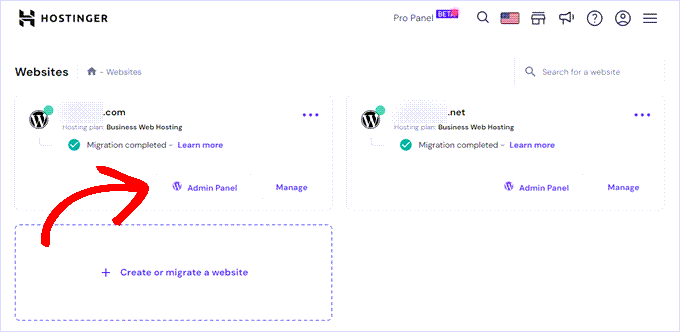
You can also go to yoursite.com/wp-admin directly in your browser.
3. Choose a Portfolio Theme
Once you have your WordPress set up, you’re ready to customize your website design by choosing a theme and creating new pages.
For this tutorial, we’ll use SeedProd to create a theme specifically for portfolio websites.
SeedProd is the best WordPress page builder on the market. It lets you quickly and easily create any type of page without writing a single line of code.
Whether you want to create a portfolio website to land potential clients, start a WordPress blog, or an online store, SeedProd is a one-stop solution that gives you templates tailored to your needs.
You’ll want to install and activate the SeedProd plugin. For more details, please see our guide on how to install a WordPress plugin.
Upon installation, you’ll be prompted to complete the setup wizard. You can click ‘Get Started’ and follow the step-by-step instructions so that SeedProd can configure the plugin to suit your needs best.
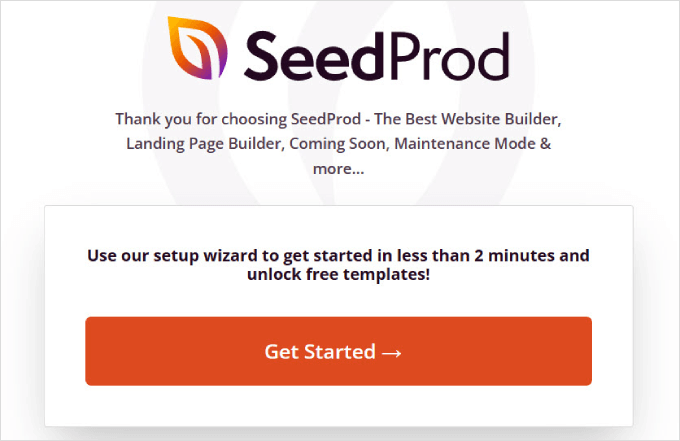
When you’ve completed the setup wizard, you can head over to SeedProd ≫ Settings and enter your license key. You can find your license key under your accounts page on the SeedProd website.
After entering the information, go ahead and click on the ‘Verify Key’ button.
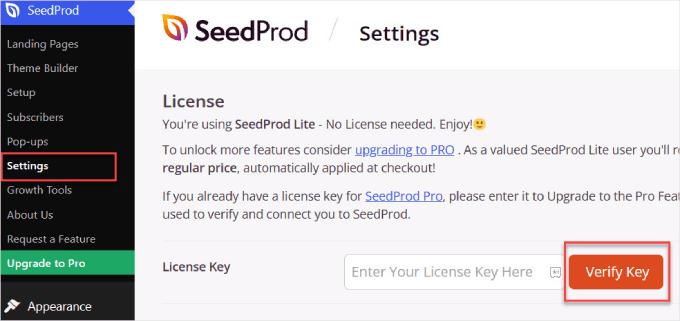
You will now have access to all of SeedProd’s features.
4. Build Your Portfolio Landing Page
Next up, let’s navigate to SeedProd ≫ Theme Builder.
From here, you can select the orange button that says ‘Theme Template Kits.’
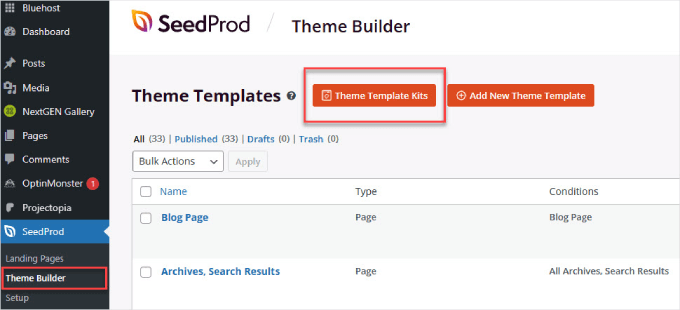
You’ll land on a page with a searchable library of WordPress themes to choose from. Simply type in ‘portfolio’ in the search bar and select the theme template that best fits your website idea.
Also, you may want to search other keywords if you’re in a specific niche. For example, if you are a realtor, you can find real estate WordPress themes on SeedProd.
We’ll choose the ‘Freelance Portfolio’ theme, but feel free to pick any theme that fits your needs.
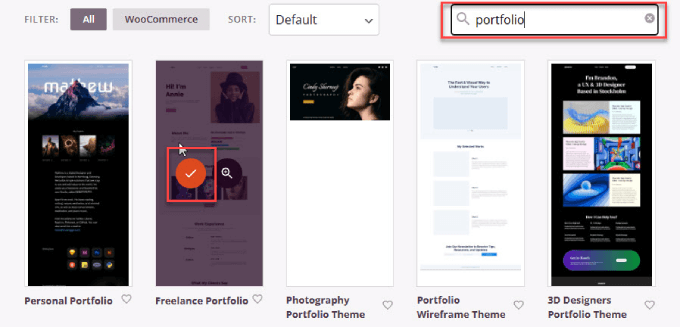
We’ll be creating a one-page portfolio site. It means that the portfolio page is part of the website’s homepage. This way, you can get your portfolio site up and running quickly without the hassle of designing multiple pages.
In the WordPress dashboard, let’s head over to Settings ≫ Reading. Next to the Homepage, select the ‘Portfolio’ dropdown to make your portfolio page your Homepage.
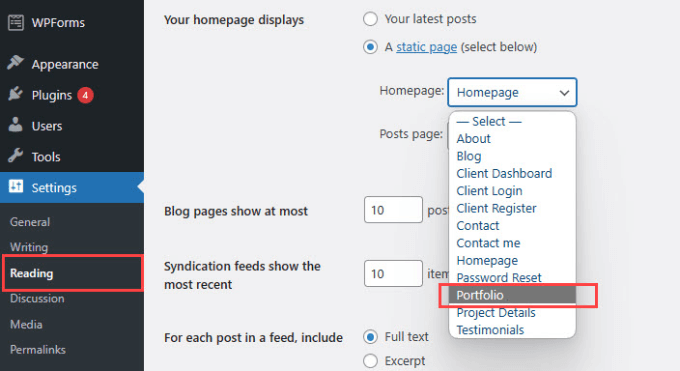
Then, you’ll want to head back to SeedProd ≫ Theme Builder, and you’ll see a list of all the pages within the theme.
From here, you’ll need to scroll down and hover over the ‘Portfolio’ page. Then, simply click the ‘Edit Design’ button.
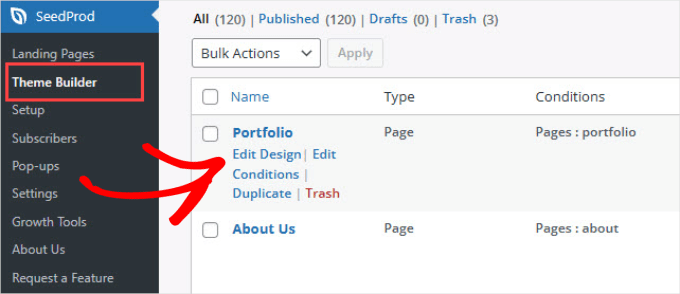
5. Edit the Portfolio Website
Now it’s time to edit the content and make it your own.
On SeedProd’s visual, drag-and-drop page builder, you’ll see plenty of ‘Standard’ and ‘Advanced’ widgets to choose from. These include a headline, text, list, header, featured image, and so on.
Simply drag the widget you want and move it to the exact location you want that element.
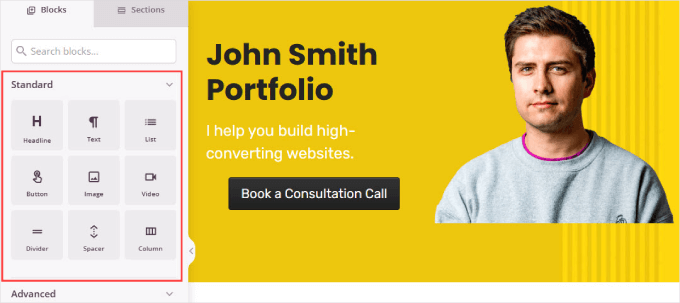
You can also customize the background to your liking by choosing a solid color, gradient color, or background image.
Just click on the outer layer box, and under ‘Content’ in the sidebar menu, you’ll see options to customize your background.

If you need help working with the SeedProd interface, you can watch our SeedProd video tutorials.
When editing the contents of your main portfolio page, there are several key components you want to include, such as:
Strong Call to Action (CTA): Portfolio sites should have a clear CTA button to allow visitors to hire or get in touch with you. The CTA button should be placed both above the fold and at the bottom of your page.
Just find the ‘Button’ box in the left-hand menu and drag it to your page on the right.
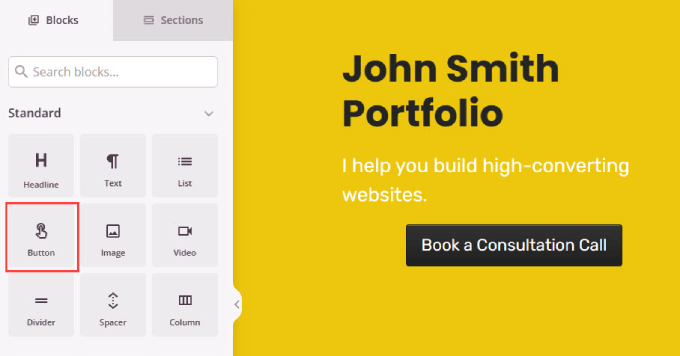
When editing any element, you must click on the specific element or area you want to customize.
The options for that block appear to the left. As you can see below, the ‘Content’ tab lets you edit the button text and link it to your contact page or even to an embedded form lower on this same page.
The ‘Templates’ tab lets you choose the button style, and the ‘Advanced’ tab lets you change the padding, fonts, and more.
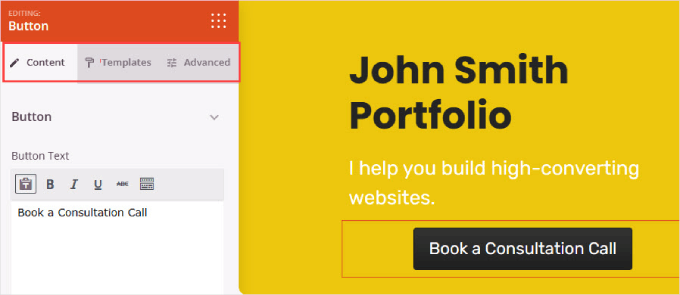
Services you offer: Visitors want to know what you offer so they can be sure you can do what they want. For instance, as a WordPress developer, do you code custom plugins, offer website customizations, or build websites from scratch?
To create a services section, just add a ‘Column’ widget and insert an ‘Icon Box’ for each service we offer.
Then, you can customize the text and icons as needed by clicking on the element and using the sidebar.
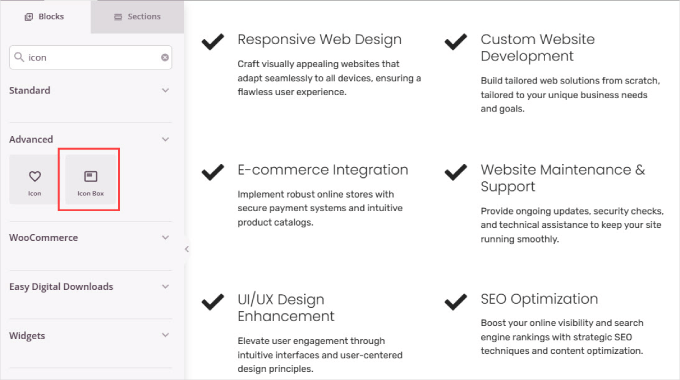
About Me section: Potential customers and clients also want to know more about your background and experience. This is a chance to build a connection with people and showcase your passion for what you do.
To create an ‘About Me’ section, you only need to add the ‘Image Box’ widget to the page. Then, simply add a portrait photo of yourself and write a description that tells people more about you.
If you are creating a portfolio for a business or brand, you can use your custom logo here instead.
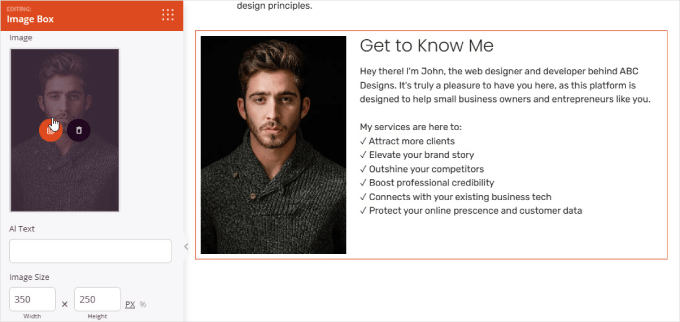
Testimonials: Providing testimonials from previous clients helps to build trust, especially if you’ve worked with reputable brands. Seeing that other people are satisfied with your work gives others the confidence that you can also do a great job.
Simply add the ‘Testimonials’ widget to your page. Then, you can add a photo of the client and edit their name and testimonial. If you want to add more reviews, go ahead and click the ‘Duplicate’ icon next to the person’s name.
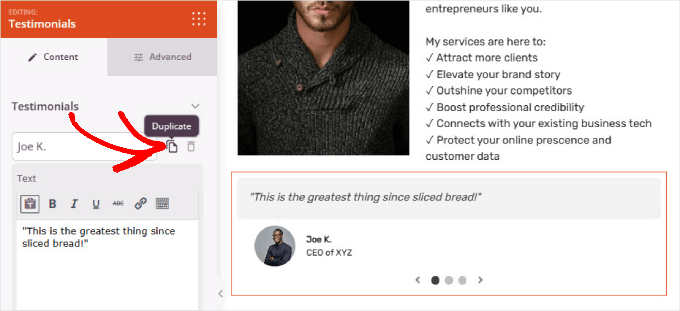
6. Add a Gallery to Showcase Examples of your Work
Creating a portfolio website gives you a chance to showcase all of the awesome work you’ve done. When potential clients see what you can do, they’ll trust that you’re the right person for the job.
To do that, we’ll use Envira Gallery, which is the best WordPress gallery plugin. While you can use the ‘Advanced Gallery’ widget on SeedProd, Envira Gallery gives you more functionality.
For example, it comes with ‘Lightbox’ images. This means that when someone clicks on a photo, it automatically displays the full dimensions without needing to crop or resize them. You can even add slideshows and organize your galleries into albums to better categorize your work.
First, let’s install and activate the Envira Gallery plugin. For detailed instructions, follow our guide on how to install a WordPress plugin.
Upon activation, you can head over to Envira Gallery ≫ Add New in the WordPress dashboard.
Simply name your gallery in the title bar. Then, go ahead and click ‘Search Files from Your Computer’ to add images of your portfolio projects.
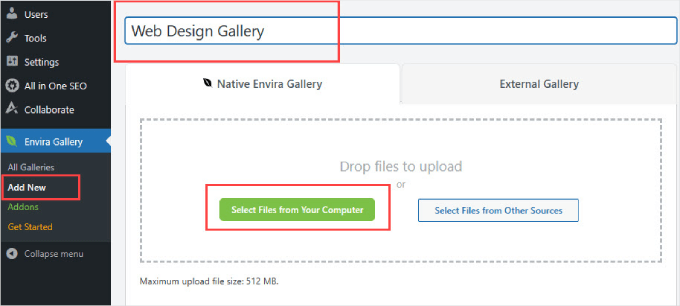
Once you’ve uploaded the portfolio items, you’ll want to scroll down and switch to the ‘Config’ tab.
Here, you can change the number of gallery columns you want to display. Setting it to ‘Automatic’ will set the number of images to automatically fill each row.
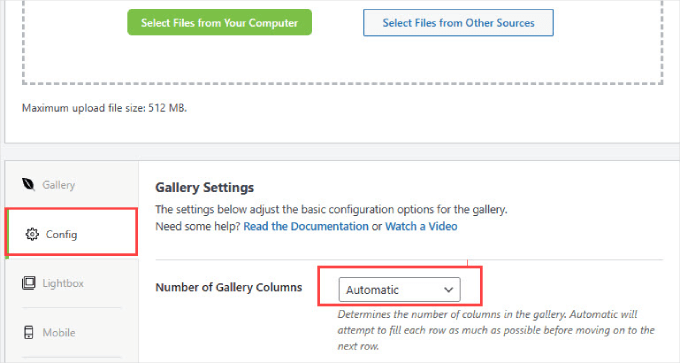
If you want to change the image sizes, you can scroll down the ‘Config’ tab and find the ‘Image Size’ option.
Then, simply select the size that best showcases your portfolio items.
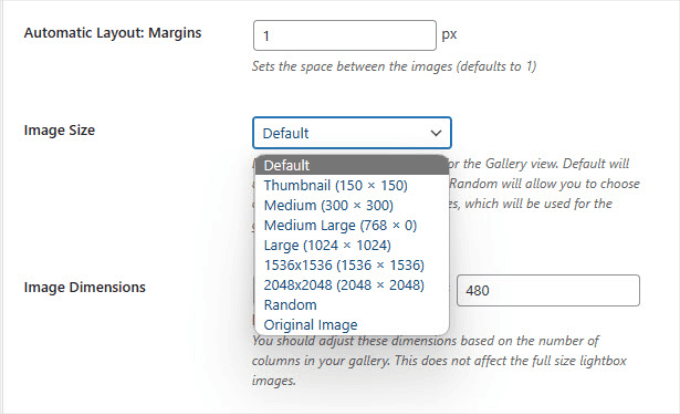
You can also adjust the Lightbox image size so that it displays the original size image when someone clicks on the picture.
To do this, you’ll need to go to the ‘Lightbox’ tab and adjust the image size to ‘Original Image.’
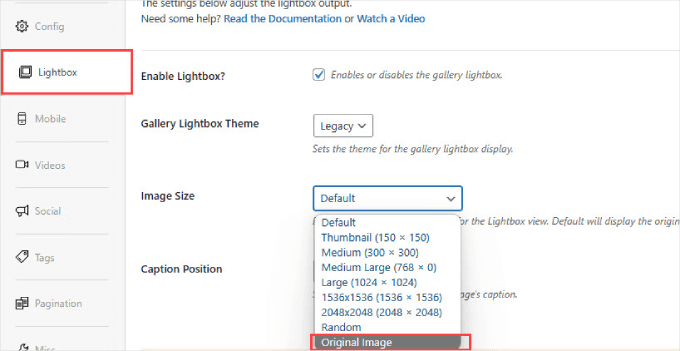
Then, you’ll want to scroll up to the top of the page and hit ‘Publish.’
Underneath the publish button, you’ll see a shortcode. Go ahead and copy the shortcode to add the gallery to our WordPress portfolio page.
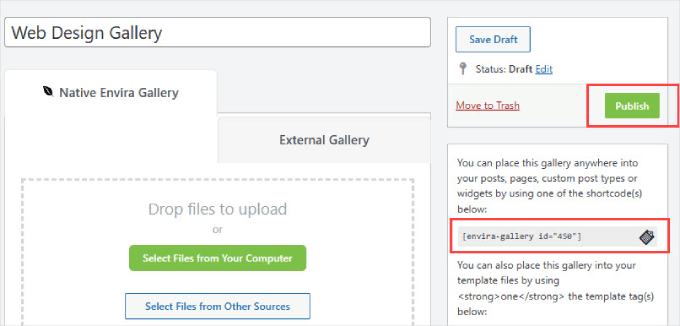
Now, let’s go back to your portfolio page in SeedProd.
The next step is to drag and drop the ‘Shortcode’ block anywhere you’d like on the page. Then, simply paste the shortcode into the ‘Shortcode’ box in the sidebar menu.
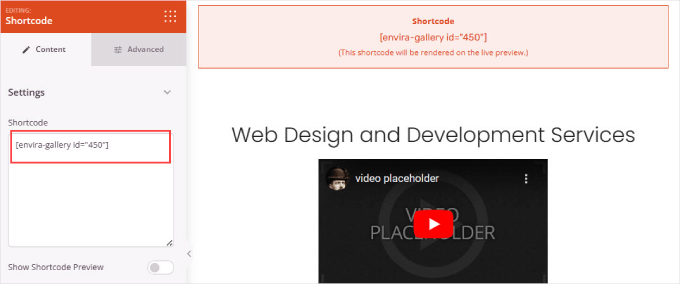
If you want to preview the shortcode, click the ‘Preview’ button at the top right corner of the page.
This will show you what the entire page looks like.
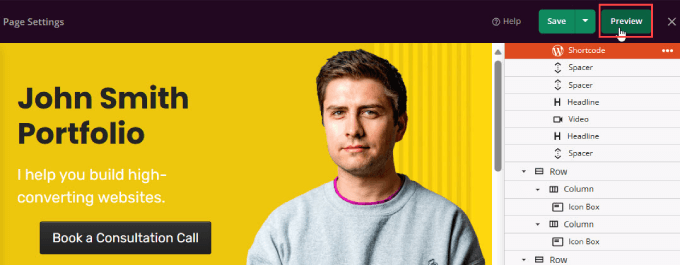
Here, you should be able to see that your Envira Gallery is embedded in your portfolio site.
With the lightbox feature from Envira Gallery, you can click on each item to see the full image.

7. Add a Contact Form
Now that you’ve reeled in your potential clients, it’s time to get them to contact you. Sure, you can just drop an email in there, but contact forms let them send you a message directly without opening up their email app.
The best way to create a simple and professional contact form is with WPForms.
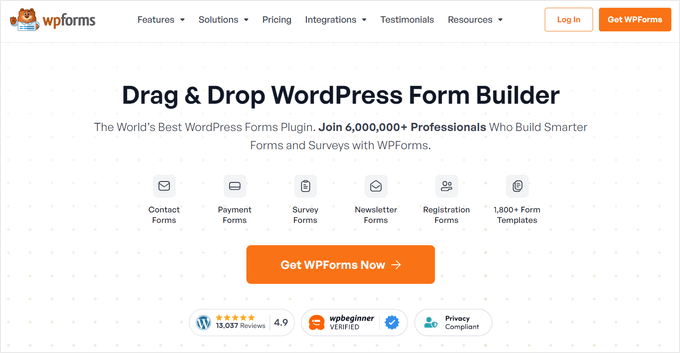
WPForms is the best WordPress contact form builder that lets you create online contact forms.
To learn how to create a simple contact form for your website so that potential clients can contact you, just follow our step-by-step tutorial on how to create a contact form in WordPress.
Once you’ve completed your form, you can go back to your portfolio page.
Then, you can use the ‘Contact Form’ widget to add a form from WPForms. Under ‘Select a Form,’ simply choose the one you’ve created.
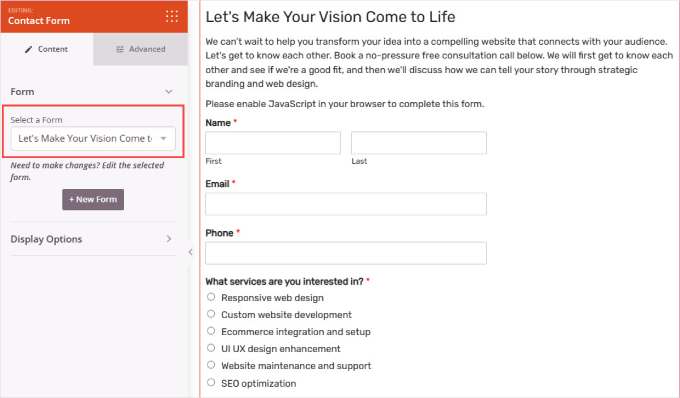
8. Make It Live
If everything looks good, you’re ready to launch your website.
All you have to do is click the arrow under the green ‘Save’ button on the top right corner. Then click ‘Publish.’
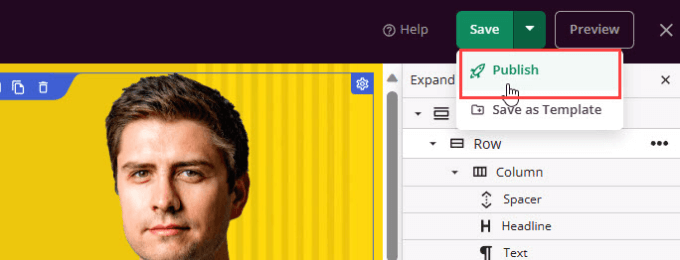
Go ahead and check the live site.
Everything should appear, including the portfolio gallery, buttons, and contact form.

Once you have a professional-looking portfolio website made, you’re ready to start sending more traffic to your site or nurture interested prospects.
We hope this article helped you learn how to create an online portfolio website in WordPress. We also recommend that you check out our guides on how to create a paid newsletter and how to make a link in bio page.
If you liked this article, then please subscribe to our YouTube Channel for WordPress video tutorials. You can also find us on Twitter and Facebook.





Suman Sourabh
As a web dev, I created my portfolio with React.js but I do have a blog with WordPress. Could blog act as another portfolio? As far as I know it can be a good thing to showcase the knowledge.
WPBeginner Support
You could certainly have a blog act as a portfolio if you wanted.
Admin
Jiří Vaněk
I’ve approached my portfolio as a blog. I write a tech blog about what interests me, using it as a showcase of my work. So, for me, a blog can be a great addition to a portfolio, demonstrating your skills and expertise in a way that can also be enjoyable and drive traffic to your website through search engines.
Konrad
one more thing to save for the future, thank you guys
wish me luck as i gather the courage to share my artworks with others :>
WPBeginner Support
Good luck
Admin
Ram E.
Thanks for another detailed guide! For more complex or bigger portfolio sites, there is also the option to create custom post types for even greater flexibility in terms of features.
WPBeginner Support
That is a good option for sites with multiple content types
Admin
Mikolaj
I’ve been in search of a great portfolio landing page for my art selling business, and it seems like SeedProd is just what I need. The simplicity and theme customization options are fantastic. Thanks for the comprehensive guide; I’m excited to give it a go!
WPBeginner Support
We hope you enjoy using the plugin
Admin
Ralph
Nice and easy step by step tutorial. I don’t really need portfolio however it gave me other idea. I will use similar concept for homepage of my blog. Above all newest articles i will place 3 big buttons/pics (sorry i don’t know how to describe it in english), that will lead to my youtube, podcast and blog. So more promotion for my other channels.
Thanks for idea!
WPBeginner Support
You’re welcome, glad our guide could give you ideas
Admin
Naveera Batool
Really an interesting and helpful article.
WPBeginner Support
Glad you think so
Admin
A Owadud Bhuiyan
I have tried to create a portfolio site but I am not able to set the blog page as Homepage.
WPBeginner Support
It would depend on the theme but if you do not set a static page under Settings>Reading, most themes set the blog page as your homepage.
Admin
Adam Michalak
Grate artictle, highly recommend it to anyone looking to learn how to create an online portfolio website in WordPress. In today’s competitive freelance market, having a portfolio website to display your best work is essential for standing out and attracting more clients. This step-by-step guide offers valuable insights on how to accomplish this, making it a valuable resource for those aiming to build their online presence as a professional freelancer.
I will recommend it to my friends who are just starting to work with wordpress
WPBeginner Support
Thank you for your kind words and we hope whoever you recommend also finds this article helpful
Admin
William Dean Dailey
This is the most effective and informative post I have read by you all.
The graphics and text were easy to understand and follow through to complete the website and publish. Thank you for that. It’s the first time I have made it to publish using WordPress and am happy with the results.
WPBeginner Support
Glad to hear you were able to publish your site
Admin
Sean Brady
I feel that developing a portfolio website with Wordpress would be a great way add to display an artist discography.
WPBeginner Support
It certainly could be
Admin
Sharon
I liked this Tutorial. Although I’m an Elementor page builder user, it’s nice to see other page builders out there and what they can do. I had a portfolio of my website at one point, but I can’t say I really liked it. I think I might try again and use some techniques from this tutorial. Thanks, WPBeginner for the useful tutorial! Awesome instructions!
WPBeginner Support
You’re welcome and glad to hear you found our tutorial useful.
Admin
Alice Elliott
Thank you for this very detailed tutorial about how to set up a portfolio website. However, I wonder why you chose a non-wysiwyg theme within your example. If you are targeting visual people, I would think this should be far more applicable, as it would be something they could relate to much more easily.
WPBeginner Support
We went with a page builder in this guide as it adds more freedom for design
Admin
priya
thanks for sharing with us .
WPBeginner Support
You’re welcome
Admin
Shafqat Khan
I’ve been looking for a way to create a portfolio landing page for my photography business, and SeedProd seems like the perfect solution. I love how easy it is to use and customize the theme templates. Thank you for this detailed guide, I can’t wait to try it out!
WPBeginner Support
Glad to hear our guide was helpful!
Admin